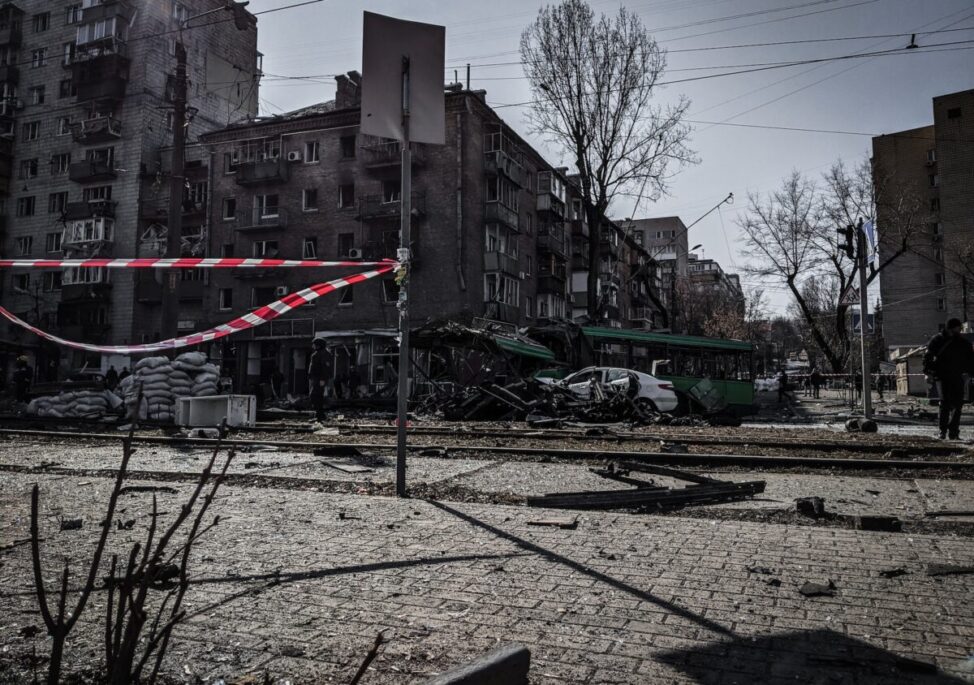On January 24, a press conference “Nothing sacred: war crimes of Russian occupiers against religious communities and clergy” was held, which was initiated by the Center for Civil Liberties and the Media Center Ukraine – Ukrinform. At the event, experts provided evidence of religious persecution in the occupied territories and violations of International Humanitarian Law in relation to places of worship during hostilities by the aggressor, reports the Christian Megaportal inVictory with reference to the Center for Public Freedoms and RISU.
Among the conference speakers were a member of the expert council of the Center for Civil Liberties Vyacheslav Likhachev, Chairman of the State Service of Ukraine for Ethnopolitics and Freedom of Conscience Viktor Yelensky, Director of the Kharkov Human Rights Group Evgeniy Zakharov, religious scholar, head of the project “Religion on Fire” and the Workshop of Academic Religious Studies Ruslan Khalikov.
Vyacheslav Likhachev explained why it is important to talk about the crimes that the occupiers commit against the clergy and our religious values, and what they testify to:
“Oppression on religious grounds was and is part of a stable system of practices in the Russian Empire, in the Soviet Union and in modern Russia now. Why is this important in the context of the Russian-Ukrainian war? In the international political arena, the Russian Federation is trying to create an image of an old style – a traditional empire that cares about conservative values. Around the world, many in conservative religious circles listen to this propaganda. Russia looks like an alternative to the modern secular left-liberal Western world, which is attractive in the eyes of the conservative part of the international community.
This is not logical, because crimes on religious grounds, against clergy and places of worship can be clearly seen in the last almost two years of full-scale aggression. But before that, we observed this for almost ten years in previously occupied territories, so we can talk about a systemic and massive phenomenon of religious oppression in the Russian Federation. This is important from the point of view of International Humanitarian Law, because places of worship, as well as educational and medical institutions, have protected status, so the systematic practice of their destruction is a war crime. This concerns hundreds of buildings that were damaged or destroyed during the fighting.
Russia is trying to create an image as a defender of canonical traditional Orthodoxy, but it is not only representatives of Jehovah’s Witnesses, certain Protestant communities or Muslim communities that are being oppressed in the occupied territories – also representatives of what Russia itself considers to be traditional faiths. Recently, officially, the Ukrainian Orthodox Church of the Moscow Patriarchate suffered the largest number of destroyed, damaged religious buildings, churches and communities during the hostilities and in the occupied territories.”
Viktor Yelensky added to Vyacheslav’s words:
“Russia can in no way be a defender of traditional values, because it is, as they say, a champion in abandoned children, crimes recorded per 100 thousand population, suicide and alcoholism. There, people donate the least to volunteer and charitable causes. And there is one of the lowest rates of religious behavior; in particular, people very rarely go to church. The current Russian Federation is an immanent enemy of freedom of conscience. It is the enemy of the manifestation of free will and free thought. And religious organizations, especially in Ukraine, are alternative centers and people who cannot agree with the pseudo-values that the Russian Federation propagates.
Immediately after the start of the war in February 2014, where Russia came, religious freedom immediately ended. Protestants and the Kiev Patriarchate in Crimea were shocked by the laws that exist in the Russian Federation. We cannot even imagine to what extent control over religious life is regulated there; everyone who does not belong to the Moscow Patriarchate is persecuted, and even those who belong, but can afford to change the formula of prayer not for the victory of Russian weapons, but for peace. As soon as the Russian Federation came to Crimea, its victims were the Pentecostals, evangelists, Baptists, who left the peninsula in entire communities.”
“I present data for the last two years of the war, which is in the database of our project “Religion on Fire” on the destruction of religious buildings. Often the attacks that Russia carries out on Ukraine are indiscriminate, that is, they hit everywhere – this is both the inaccuracy of their weapons and their willingness to sacrifice anything to achieve their goals. Religious buildings come under fire just as often as hospitals, schools, residential buildings, and the like. Sometimes we can say that religious buildings were clearly targeted. For example, when a temple is located on this territory for a long time, it is on the maps.
There are cases in Irpen, Severodonetsk, and in some other settlements, where, people testified, there was drone reconnaissance. The Russians saw what was happening on the territory, and then the religious building was shelled. Or when a religious building is located separately from others, there is no house, potential checkpoint or barracks nearby. Therefore, we can say that this is a deliberate shelling of specifically religious objects,” says Ruslan Khalikov.
“Since the beginning of March 2022, the Kharkiv Human Rights Group has been maintaining a database of probably committed war crimes, mainly against civilians. Today there are about 65 thousand incidents. To study the category of affected clergy, we conducted a search in the database. An analysis of victims in 73 crime incidents yielded the following results. In 23 cases, clergy were mentioned in passing, in connection with crimes that did not concern them, the remaining 50 incidents are relevant.
In 2 cases, the priests were deliberately killed with small arms, in 5 cases they were killed as a result of bombing by various types of weapons (barrel artillery, rocket attacks, etc.), in 8 cases they were wounded as a result of such attacks.
One priest was deported – kicked out of his hometown, his further fate is unknown. In one case, the Russian military forced the priest and parishioners out of the church and took the building for their own use. In another case, the Russians emptied the church and nearby church houses: they literally took everything away, even liturgical things. Finally, in another case, the Russians placed their artillery near the church, and refused the priest’s request to allow him and his family to move to live in another house. Regarding attacks on a “house of worship”, it turned out that the database documented the destruction or damage of 343 such houses,” explained Evgeny Zakharov.
Video:





